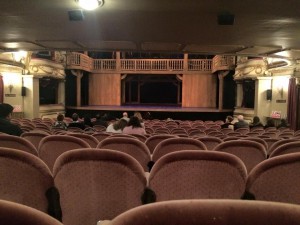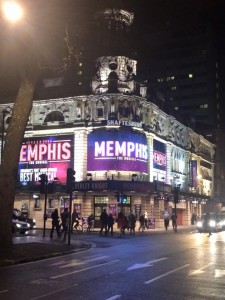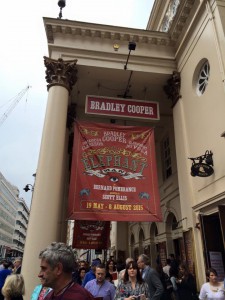‘How Can I Compare Thee…” Shakespeare In Love, Noel Coward Theatre, London 3.04.2015
 So it had been a few months since my last trip to London, and I couldn’t wait any longer! a theatre trip was needing to be taken, and who else but to discuss with Hayleigh which one it should be.
So it had been a few months since my last trip to London, and I couldn’t wait any longer! a theatre trip was needing to be taken, and who else but to discuss with Hayleigh which one it should be.
I wanted to see something new, and something different, a play, and what better one to catch would be one that was soon to sadly close. ‘Shakespeare in Love.’ So on Good Friday it was off to my favourite place (as you know) and after a stroll around Carnaby Street, then a scrummy dinner at Bubba Gumps Shrimp and Co (highly recommend!) we wondered to the Noel Coward Theatre to take our seats.
I had been to the Noel Coward Theatre many years before, when I had seen ‘Avenue Q’ and the first time that I had visited the stage door (which is the blue door that is my background to this website), and Jon Robyns, during that performance we were up on the Balcony which was very high, and got my knees shaking so when choosing our seats this time I wanted to try a new location within the theatre seating plan. Although the play was closing pricing was still quite high and after a short discussion we decided to choose the £17.25 stalls row T and U, even with the warning of restricted view of the top of the set we were happy, and when we sat in our seats we didn’t complain, I mean how much of the set would be performed on the top? The photo below shows the view from my seat, before the seats and filled up. You can see that the warning was spot on, and you could just see the top of the set, but this was when the set was forward, during the production it gets sent back and at that point your view is fine, but when it is positioned forward you do need to even lean forward in your seat, or slide down in your seat to see what is happening otherwise you would see just trousers or skirt. But for the price that we purchased them it was what was expected. The set in general was simplistic similar to that of the Globe
view is fine, but when it is positioned forward you do need to even lean forward in your seat, or slide down in your seat to see what is happening otherwise you would see just trousers or skirt. But for the price that we purchased them it was what was expected. The set in general was simplistic similar to that of the Globe
Now onto the play. The story tells the tale of famous play writer Shakespeare, and how he came to write his famous love story Romeo and Juliet through a love affair with Viola de Lesseps.
Set in 1593, we see Shakespeare a sometime playing in the Lord Chamerlain’s Men, and a poor playwright for the Owner of the Rose Theatre Philip Henslowe. Suffering from writers block, Shakespeare’s new comedy, Romeo and Ethel, the Pirate’s Daughter (as the Queen Elizabeth, and public loved a comedy) was on stand still but still he starts to audition players to perform in a few weeks time. Viola, a daughter of a wealthy merchant who has seen all of Shakespeare’s plays perform at the court decides to disguise herself as ‘Thomas Kent’ to enable her to audition (as women were not allowed to perform during this time). Doing well in her audition Viola runs away, but Shakespeare impressed with what he had seen follows Kent to Viola’s house and leaves a message with the nurse, asking Kent to start rehearsals with him at the Rose. When there he sneaks into the house with the minstrels that are laying at the ball being held at Viola’s house and hosted by her parents who are arranging Viola’s betrothal to Lord Wessex, an impoverished aristocrat. It is at that that ball that Shakespeare see’s Viola, and falls for her immediately, and after being forcibly ejected by Wessex (and in turn gives his name as Christopher ‘Kit’ Marlowe, Shakespeare’s friend and rival), he decides to use Thomas Kent to get to her and Woo Her.
In time Shakespeare discovers Thomas’s true identity, and they being a secret love affair, and with it inspires him to write and transform the play into the famous love story Romeo and Juliet. The play is going well, and will soon finish but Viola discovers that Shakespeare is in face married, and although he is slowly becoming separated from her she realises that she cannot escape her duty to marry Wessex. Shakespeare distraught at Viola leaving, discovers that Marlowe is dead, and believes that he is the one to blame having pretended that he was him to Wessex, and Wessex suspecting the affair between Shakespeare who he believes is Marlowe approves of the recent death, and informs Viola (who in turn believes he is referring to Shakespeare). Shakespeare goes to Viola distraught at what he believes he has done to Marlowe, but Viola so happy that he is alive she declares her love for him.
Viola is then summoned to court, to receive approval of her set marriage to Wessex from the Queen Elizabeth, and Shakespeare accompanies them disguised however as a female cousin. When there he persuades Wessex to bet £50 (the amount that he requires to buy a share of the Chamberlain’s Men) that a play, or ‘his’ play can capture the true nature of love, and when the play happens it will be Queen Elizabeth that makes the judgement.
With so much at steak the players rehearse, but discovering that there is a woman player at The Rose, Edmund Tilney, the Master of Revels closes the theatre for breaking the ban on Women. It is then that Viola’s identity is exposed in front of the company which then leaves the players with no lead actor or stage to help Shakespeare win his bet. It is then the owner of the Curtain theatre Richard Burbage that offers them his theatre, and they accept. With Shakespeare taking on the role of Romeo, and a boy actor to play Juliet that the play will go on.
Viola Learns that the play will be performed on her wedding day, and runs to the Curtain, in attending to watch with the crowd, Viola overhears that the boy who as playing Juliet cannot perform (his voice had finally broken), and without even knowing informs the players that she knows every line of the play, and with that is thrown in front of the audience. The audience is enthralled even with the tragic end, it is then that Master Tilney arrives to arrest everyone for the indecency of Viola’s presence. But with the Queen being present she restrains him, and asserts that Kent’s resemblance to a wome is remarkable, but she too is powerless to end a lawful marriage, and asks Kent to ‘go get’ Viola as she is to be on the boat with Wessex to sail to the colony of Virgina. Not before however informing Wessex that Romeo and Juilet had won the bet and was to pay up the £50, and informs Shakespeare that next time write something ‘a little more cheerful’
When saying their goodbyes Shakespeare vows to immortalize Viola, as he imagines her as the castaway that disguises himself as a man after a voyage to a different land. “for she will be my heroine for all time, and her name will be…Viola”
Now the story may sound familiar to some film loves, as yes it is based on the 1998 British-American romantic comedy drama film directed by John Maddon which starred Gwyneth Paltrow, Joseph Fiennes, Judie Dench, and Ben Affleck. But I myself had never seen the film, so this story was brand new to me, and I loved it! it was poor genius, and unexpectedly really funny! I was smiling throughout and you could tell how the story slowly brings Romeo and Juliet meaning to Shakespeare… but.
The interesting this is this story is not based on a true story, just true characters as it is interesting to say that we don’t actualy know a lot about Shakespeare’s history only his birth place, his wife (which I believe was not a happy marriage), and his plays. So this play is complete fiction, writer and screen writer Tom Stoppard states “The Thing that makes life easier for someone writing fiction about Shakespeare is that there are very few signposts, very few agreed facts and lots of spaces to invent. At the beginning, there were moments when the challenge became, how does Shakespeare speak when he’s just speaking to a friend?: Does he sound like Shakespeare? Does he sound as though he’s going to be Shakespeare, or does he sound like everybody else?” Shakespeare in Love is a new unique view into Shakespeare’s era, “my intention was to knock Shakespeare off his pedestal, and fool around with him for a while and then restore him to his pedestal and have a better idea of why he belongs there. we know him as an icon, but we don’t know what he had to do to get there” says second writer Marc Norman.
We were lucky that night to have had the full cast performing, and being a play I sadly did not know many of those who were performing:
The current cast were:
Wessex – Nicholas Absury
Henslowe – Neal Barry
Tilney, Sir Robert De Lesseps – Richard Bremmer
Fennyman – Paul Brennen
Queen Elizabeth – Susanne Burden
Ned Alleyn – Ryan Donaldson
Marlowe – Edward Franklin
Wabash – Ncuti Gatwa
Will Shakespeare – Orlando Jones
Molly, Mitress Quickly – Sioned Jones
Sam- Gregg Lowe
Ralph – Andy McKeane
Burbage – Peter Moreton
Peter, Will Kemp, Barman – Sandy Murray
Viola De Lessseps – Eve Ponsonby
The cast were on top form, and all worked well together, and you could tell they were enjoying what they were doing. Orlando Jones as Shakespeare was exceedingly good, and I loved his comic timing, and his soft approach when it came to telling the story, and his love for Viola, Ryan Donaldson as Ned also gave brilliant timing in his role, and was the clown of the duo with brilliant come backs to Shakespeare and others it was hard not to like his character and a disappointment for when he past that he wouldn’t be back on stage again. Viola played by Eve Ponsonby was great, in both her lady and boy roles and loves the transition between the two, and also the scene in the boat when she had to fight the urge and lust for Shakespeare just brilliant. Even the smaller roles in the play brought light to the story and had the audience chuckling such as the Boatman played by Thomas Padden, and Queen Elizabeth played by Susanne Burden who although is playing a serious role, and lady in history portrayed a different side to the well known queen, maybe a preferred side.
The play it self is sadly no longer on our West End, but during its time I can understand why it was such a success and thankful that I got the chance to see it before it left. I hope that it will make an appearance once again as it would be one I would love to see again and I believe one that my sister and mum would enjoy (as I know they love the film) this time though I would try and get better seats for a little better view so I can enjoy it fully without having to adjust in my seat when the set changed. Having not seen the film before I am tempted to watch it to see the difference between the too, but as I have always believed live performance is a so much better than watching a film!
So if this play goes on tour or hopefully returns I will be booking my tickets!

